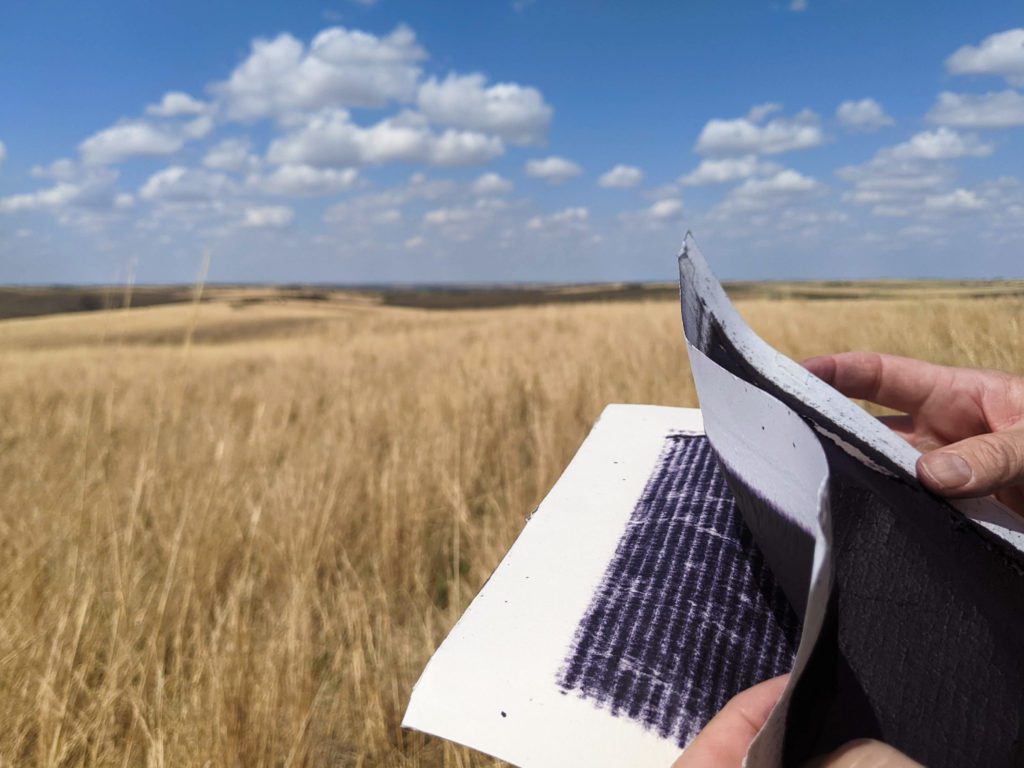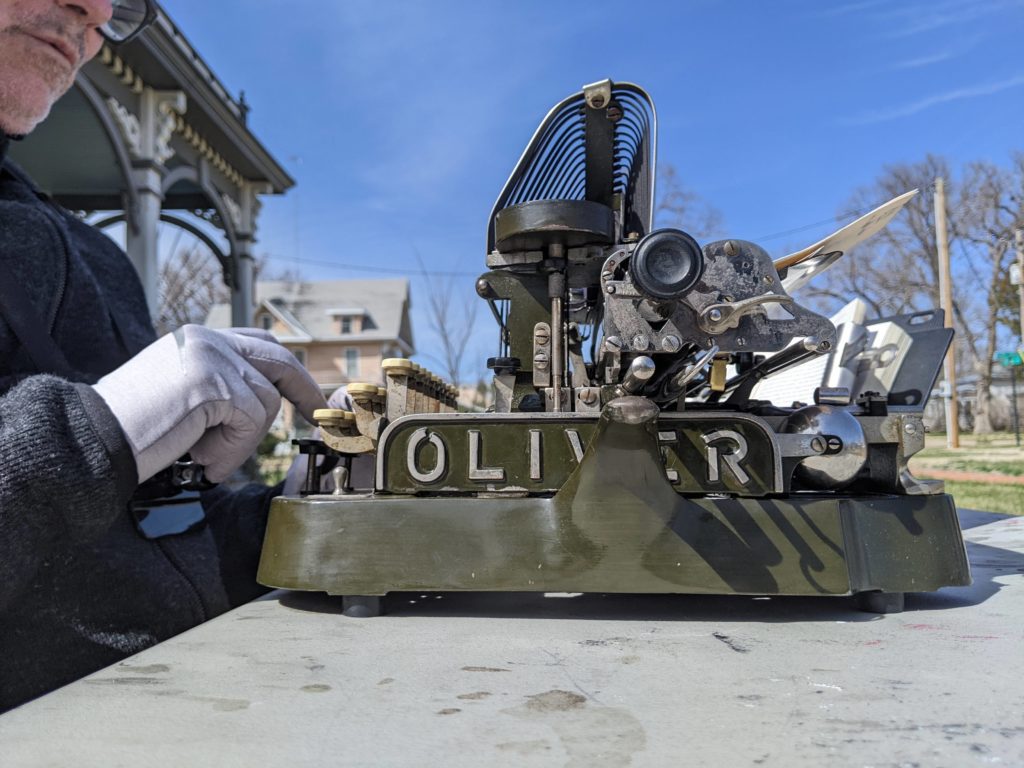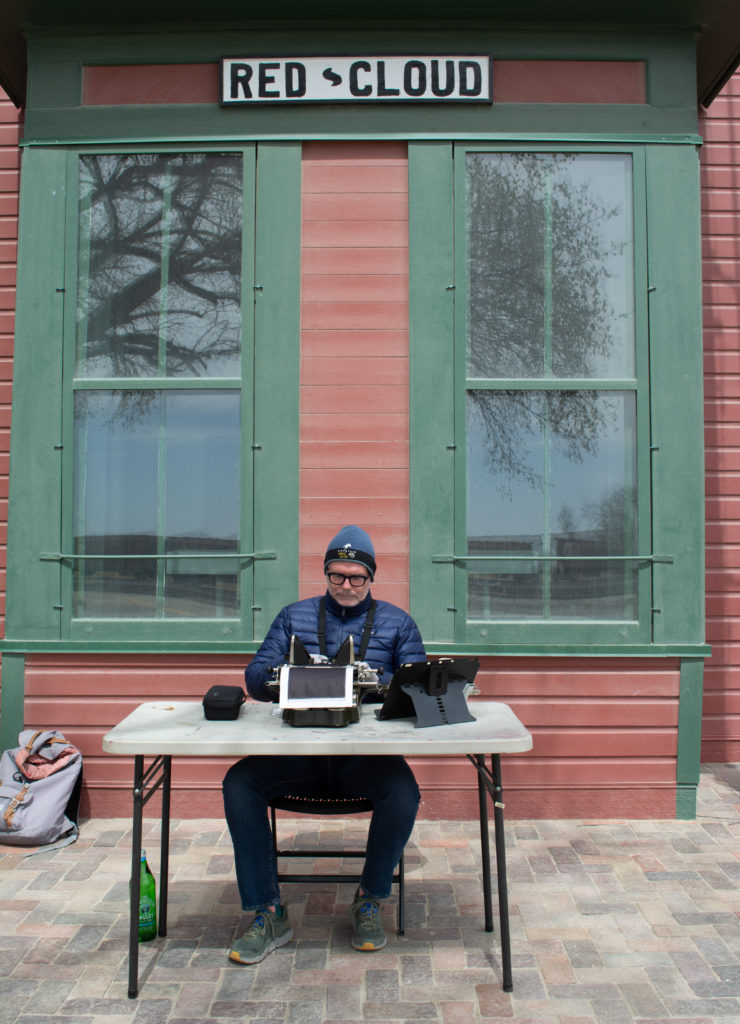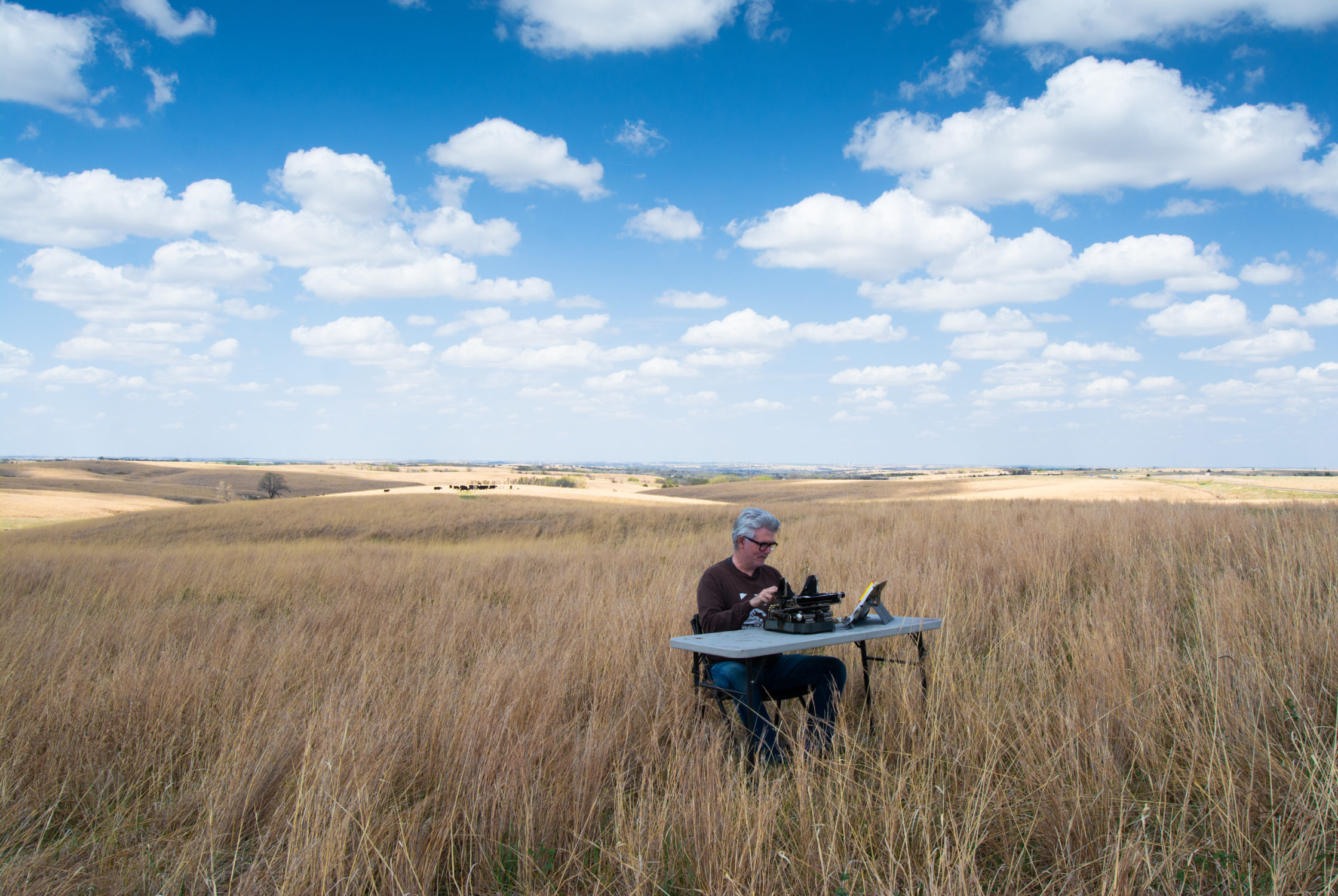He sits solitary on the front porch of the most famous literary home in Nebraska, bundled in a purple ski jacket to endure the too-cold April morning.
The fact that he’s perched on Willa Cather’s childhood porch on a frigid Monday gives Tim Youd away as an outsider. So does the GoPro he’s harnessed to his chest to video-record his work.
But it’s what Youd is doing that grabs the attention of the stray motorist driving down Cedar Street in Red Cloud – or would, if the driver glanced toward Willa’s house, rolled down a window and heard a sound from a bygone era.
Clack-clack-clackclackclack-clack. Ping!
Clackclack-clack-clack-clackclackclackclack-clack. Ping!
Youd is typing on an Oliver Model 3 typewriter, believed to be the model that Cather herself used. He is retyping the Cather book, “The Song of the Lark,” – every word of it – during his 19-day trip to this 1,000-person Nebraska town, the place Cather grew up and mined for characters and scenes for her most famous books.
He is typing on this April morning in Red Cloud like he has typed another Cather classic in Lincoln, and will in early May type a third in Omaha’s Old Market. He’s rewriting the entire thing on a single sheet of paper, banging the same keys to the same parchment again and again until Cather’s words bleed together, indistinguishable.

It has become an ocean of black ink bordered in white. It has become a work of art – the 73rd novel Youd has retyped during his 100 Novels Project, equal parts performance art and one man’s decades-long literary meditation.
He’s on page 360. His typewriter clacks, blending with the birds chirping in the nearby city park and the occasional semi-truck rumbling down the brick Main Street. Then it’s completely quiet. Only the sound of the typewriter pierces the small-town silence.
Sixty pages left.
“When I started this, I didn’t know it was going to be 100 novels,” he says as he continues to type Cather on the front porch where little Willa once played. “I didn’t even know it was gonna be two.”
A germ of an idea came to him as he was visiting Ernest Hemingway’s house in Key West, the one famous for the six-toed cats still roaming the grounds. Youd visited like so many others, another tourist checking an obligatory box on his Key West journey.
It made him a little depressed. It made him think: What is a literary pilgrimage, really? What can truly bring me closer to a great writer?
Then Youd read that Hunter S. Thompson retyped “The Great Gatsby” so he could know what it felt like to write a great novel.
So Youd sat down himself and retyped Thompson’s “Fear and Loathing in Las Vegas.”
He found himself reading the book more closely than he had read before. He felt connected to the book, his brain, his fingers.
“Your senses can become totally activated when you do this,” he says. “I can find almost a euphoric state when I’m fully engaged…better than being drunk. It’s the greatest high you can have.”
He decided to do it again. He got an idea: Maybe he could use the typewriter of the author he was retyping. He got another idea: Maybe he should travel to the spot where the great novelist wrote, lived, came of age.

He went to a Brooklyn sidewalk, around the corner from where Henry Miller grew up. He began to type Miller’s “Tropic of Capricorn.” He put out a sign that asked people not to disturb him.
Within an hour, he took the sign down.
“I realized that people wanted to talk, that conversation and curiosity was a part of this. That’s what books do.”
And now: “Some of the best conversations in my life have been talking about a book.”
He has been doing this for more than a decade. He has retyped the Bukowski novel “Post Office” outside the Los Angeles post office where Bukowski hated to work.

He retyped Hemingway’s “A Farewell to Arms” at the Italian hotel where Hemingway recuperated after being wounded during World War I. He has retyped William Faulkner at Faulker’s Mississippi house and Raymond Chandler at Chandler’s California house and Virigina Woolf at Woolf’s English cottage.
He has typed in a prison tower at Sing-Sing and on a bridge in Big Sur and on a cliff overlooking the ocean.
Word of the project reached Karin Campbell, a curator of contemporary art at Omaha’s Joslyn Art Museum.
In March 2020, she and the LA artist began to talk about a Cather-inspired trip to Nebraska. Youd had long ignored Cather, thinking she wrote, “Little House on the Prairie stuff.”
Then, on a recommendation from a friend, he decided to read “O Pioneers!”
He realized he loved it.
“Cather isn’t some fussy fiction writer. She really gets right at it. It’s profound. It’s moving,” he said of “O Pioneers!” “It’s a sex and murder story!”
Then COVID-19 hit, the world shut down, and Youd found himself retyping novels alone in his studio.
Campbell got an idea. The Joslyn was closing for its massive expansion and remodeling in May 2022. What if Youd came then, to show Nebraskans that the Joslyn could still connect the public to art, even with the museum closed?
“This is literally right on the street, and anyone who wanders by can connect to this experience,” Campbell said. “The reality of performance is you can only plan it so much. When you put it in a public space, it changes the rules. Each one becomes distinct.”
In early April, Youd typed “O Pioneers!” in Lincoln, often while sitting in the University of Nebraska-Lincoln’s Willa Cather Archive.
In early May, he’s re-typing “My Antonia” in the Old Market, surrounded by street performers and both Omahans and tourists curious about the typewriter and the man using it.
On Saturday May 7, Youd and Campbell are appearing together for a 12:30 p.m. art talk, “Retyping Willa Cather” during Millwork Connect, an all-day free event held at Omaha’s newly redeveloped Millwork Commons neighborhood.
In between his trips to Nebraska’s two biggest cities, he journeyed to Red Cloud. There, he re-typed “The Song of the Lark” at Cather’s childhood home, and also at homes that feature prominently in her books.
On one of the nicest days, he moved his typewriter to the Willa Cather Memorial Prairie. Alone save for a photographer, he typed surrounded by 600 acres of never-plowed ground. He typed surrounded by native grasses blowing in the spring wind.
Back at the Cather childhood home on this April Monday, he is clacking away, typing two-fingered. The frigid morning has turned warmer, sunnier. As he types, he talks about how he has given the better part of his adult life to this project. How he has become obsessed with typewriters. How he has become a much better reader, focusing on the author’s words and intent.
He estimates that the 100 Novels Project will take six more years to complete. Maybe he will finish in New York City, Los Angeles, London.
But he likes it here in Red Cloud, where the only sounds are the birds and his typewriter. Where you can close your eyes and imagine Cather herself typing away.
“I wanted to get as close to her as I possibly could,” he says as he sits on her childhood front porch. “And I feel very close to her right here.”




5 Comments
Only in the Flatwater Free Press would I have been privileged to read such a delightful story. Again, I love your paper!!
I love your article, a super Cather fan. Your grandmother surely loved it as she is so proud of you, told me herself.
I totally enjoyed this article and enjoyed how Youd feels close to the authors at their homes,etc. Thanks for another interesting article.
I taught in Red Cloud for a short spell early in my career. I was a native Nebraskan, but living in Red Cloud made me a true Cather fan! Walked by her childhood home all the time.
Willa Cather was one of my mother’s favorite novelists. Little did Mom know I would someday move to Nebraska, the Land of Cather.